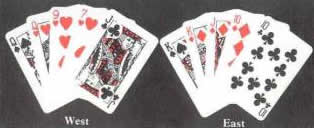Law Of Probability
There are a number of stock poker hands, holding which a player should play and not propose, and equally refuse the opponent’s proposal. The more important of them are set out below. In all cases spades are trumps:
Any three trumps supported by two inferior cards in outside suits- ♠J, 10, 7; ♥ 8; ♦ 10.
Any two trumps supported by three cards in one outside suit – ♠ 10,8; ♥ J, 8, 7
Any two trumps supported by the King and a low card in an outside suit, and one indifferent card in another suit – ♠ A, 8; ♥ K, 7; ♦ 9.
Any one trump supported by four cards headed by the King (or Queen) in an outside suit – ♠ J; ♥ K, 9, 8, 7 (or Q, J, 8, 7).
Any one trump supported by three cards headed by a court card in an outside suit, and any high court card in another suit – ♠ 10; ♥ J, 10, 7; ♦ Q.
Any hand that contains three Queens (or better ) and even though it may lack a trump card – ♥ Q, 7; ♦ Q, 7; ♣ K.
Any hand that contains four high cards (King, Queen, Jack) and even though it may lack a trump card- ♥ K ,♦ Q ,J ; ♣ Q, 7.
These stock hands are based on the law of probability, supported by the experience of the best poker players, who set great store on them. So far as the dealer is concerned, they are the minimum types of hands for him to play on.
In a number of cases he may do better if he follows his luck, or decides to play on what is called a hunch, but the non-dealer should never propose when holding a hand similar to one of the above types. The reason is that he has the opening lead, and, at Ecarté, the opening lead is of vital importance.
East deals and the ♠ 10 is turned up. The hands are shown below. West plays and if he leads ♥ Q he wins the Trick no matter how East plays.
If, however, West had dealt, East would be on lead and if he led the ♦ K he would win the Trick no matter how West played. In fact, West would be hard put to save the Vole, and, indeed, would do so only if he retained the ♣ J and not the ♥ Q.
An experienced online poker player would, of course, retain the ♣ J (although the ♥ Q is a higher card) because he holds three hearts and only one club, and since there are only eight cards in a suit it is about seven to five on that East’s last card is a club and not a heart.

The deal is of some interest because it illustrates the danger of leading the Queen of trumps. It will be seen that if West decides to lead the ♠ Q, East wins with the ♠ K, runs his diamonds (scoring the Trick ) and West will save the Vole only if he retains the ♣ J. On the other hand, it is to be noted that the lead of the single-ton King of trumps is nearly always a good lead, and rarely damages the leader’s hand.
As a general poker rule it is best for a player to play when he cannot see his way to discarding more than two cards; but if a player’s hand guarantees him the Trick, or virtually so, he should propose or accept, because if the proposal is refused he is on easy street (since the Trick is more or less in his pocket) and if the proposal is accepted he has the opportunity to convert his hand into one on which he may win the Vole.
